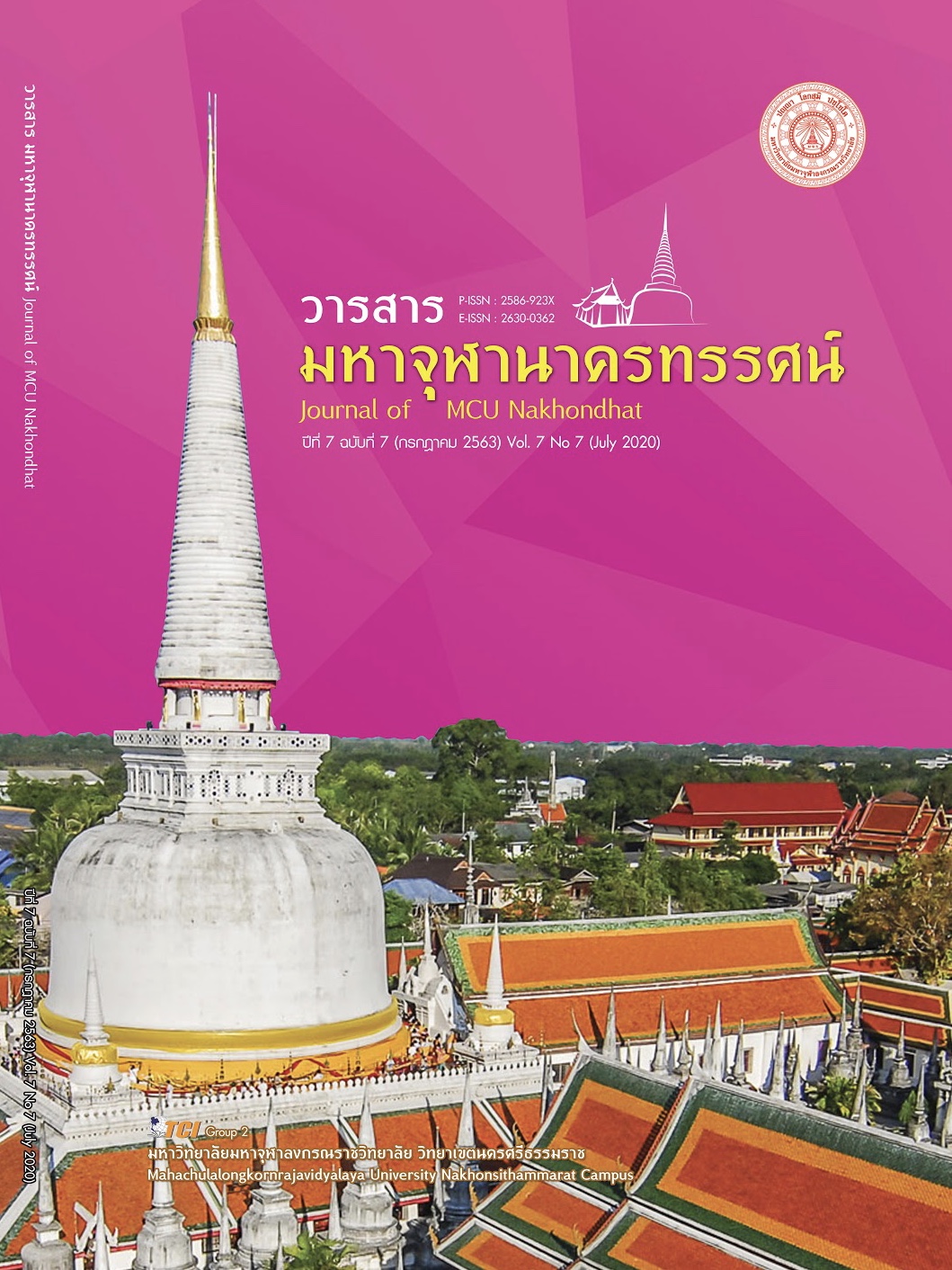ADMINISTRATIVE GUIDELINE DEVELOPMENT OF EDUCATIONAL INSTITUTES BASED ON GOOD GOVERNANCE FOR SCHOOLS IN THE SECONDARY EDUCATIONAL SERVICE AREA ZONE 33
Main Article Content
Abstract
This research aimed to 1) current and desirable situation, 2) administrative guideline development of educational institutes based on good governance for schools in the Secondary educational service area zone 33 This research was divided into 2 periods. The first period was a study of research instrument comprised evaluation of the study of elements and indicators of educational institutes based on good governance for schools. Research sample included 350 teachers using Stratified Random Sampling. Research instrument comprised the second period evaluation of Administrative Guideline Development of Educational Institutes Based on Good Governance for Schools in the Secondary Educational Service Area Zone 33. Informants were 9 heads of each division. Research instrument was interview form. Statistical analysis comprised mean and standard deviation.
This research found the following results: 1) Current conditions, school administration based on good governance principles for schools Under the Office of Secondary Educational Service Area 33, it is at the medium level. Desirable Conditions School administration based on good governance for schools. Under the Office of Secondary Educational Service Area 33, the overall is at the highest level. 2) Guidelines for school administration based on good governance principles for schools consisting of 4 aspects, 24 guidelines can be summarized as follows The administration should have a meeting to formulate an action plan in accordance with the operational agreements provided by the area. There is a clear action plan and recruitment and appointment procedures. There are activities for students to learn from real experience. Disclose procedures and guidelines for accepting students at every step. Jointly plan the educational administration between the school and those involved and decentralize Have a policy to instill good values and promote morality in all groups Give an opportunity for those involved to select textbooks Require stakeholders to listen to their opinions on activities that will affect the stakeholders.
Article Details
References
โชคสุข กรกิตติชัย. (2560). ทิศทางการปกครองส่วนท้องถิ่นตามรัฐธรรมนูญแห่งราชอาณาจักรไทย พุทธศักราช 2560. Hot Issue, 2560 (สิงหาคม), 1-7.
นภัสนันท์ ศรีคุณ. (2559). แนวทางการใช้หลักธรรมาภิบาลของผู้บริหารในการบริหารสถานศึกษาสังกัดสำนักงานเขตพื้นที่การศึกษามัธยมศึกษา เขต 27. ใน วิทยานิพนธ์การศึกษามหาบัณฑิต สาขาวิชาการบริหารและพัฒนาการศึกษา. มหาวิทยาลัยมหาสารคาม.
พระนที สิริปญฺโญ. (2560). การบริหารงานตามหลักธรรมาภิบาลในโรงเรียนพระปริยัติธรรมสังกัดสํานักงานพระพุทธศาสนาแห่งชาติ จังหวัดขอนแก่น. ใน วิทยานิพนธ์พุทธศาสตรมหาบัณฑิต สาขาวิชาการบริหารการศึกษา. มหาวิทยาลัยมหาจุฬาลงกรณราชวิทยาลัย.
พระราชบัญญัติการศึกษาแห่งชาติ (ฉบับที่ 2) พ.ศ. 2545. (2545). ราชกิจจานุเบกษา เล่มที่ 119 ตอนนที่ 123 ก หน้า 16 (19 ธันวาคม พ.ศ. 2545) .
วิวัฒน์ชัย ศรีจันทร์. (2560). การพัฒนาแนวทางการบริหารงานวิชาการโดยยึดหลักธรรมาภิบาล สำหรับโรงเรียนสังกัดองค์การบริหารส่วนจังหวัดนครราชสีมา. ใน วิทยานิพนธ์การศึกษามหาบัณฑิต สาขาวิชาการบริหารและพัฒนาการศึกษา. มหาวิทยาลัยมหาสารคาม.
ศิรินารถ นันทวัฒนภิรมย์. (2547). การบริหารสถานศึกษาขั้นพื้นฐาน ตามหลักธรรมาภิบาล อำเภอเมืองลำพูน. ใน วิทยานิพนธ์ศึกษาศาสตรมหาบัณฑิต สาขาวิชาการบริหารการศึกษา. มหาวิทยาลัยเชียงใหม่.
สำนักงานเขตพื้นที่การศึกษา มัธยมศึกษา เขต 33. (2562). แผนปฏิบัติการประจำปีงบประมาณ พ.ศ.2562. สุรินทร์: สำนักงานเขตพื้นที่การศึกษามัธยมศึกษาเขต 33.
อารยา บุตรพรม. (2559). การพัฒนาแนวทางการบริหารสถานศึกษาตามหลักธรรมาภิบาลของผู้บริหาร สถานศึกษาสังกัดสํานกังานเขตพื้นที่การศึกษามัธยมศึกษา เขต 24. ใน วิทยานิพนธ์การศึกษามหาบัณฑิต สาขาวิชาการบริหารและพัฒนาการศึกษา. มหาวิทยาลัยมหาสารคาม.
อิทธิพล บุญเดช. (2555). การบริหารงานตามหลักธรรมาภิบาลของผู้บริหารในสถานศึกษาสังกัดองค์การ บริหารส่วนจังหวัดขอนแก่น. ใน การศึกษาค้นคว้าอิสระศึกษาศาสตร์มหาบัณฑิต สาขาวิชาการบริหารการศึกษา. มหาวิทยาลัยขอนแก่น.


